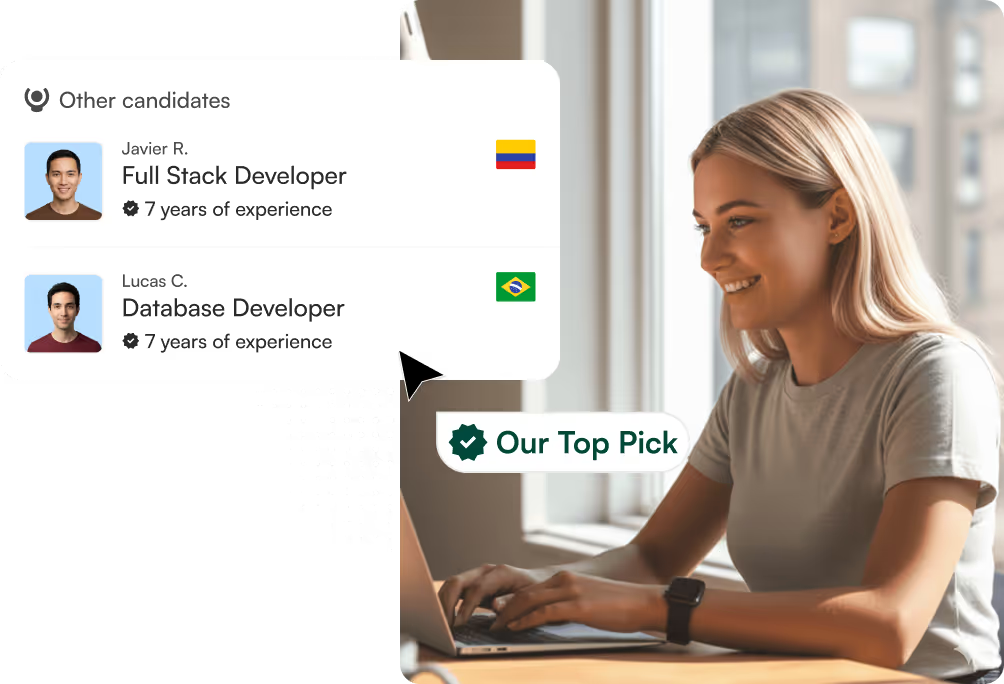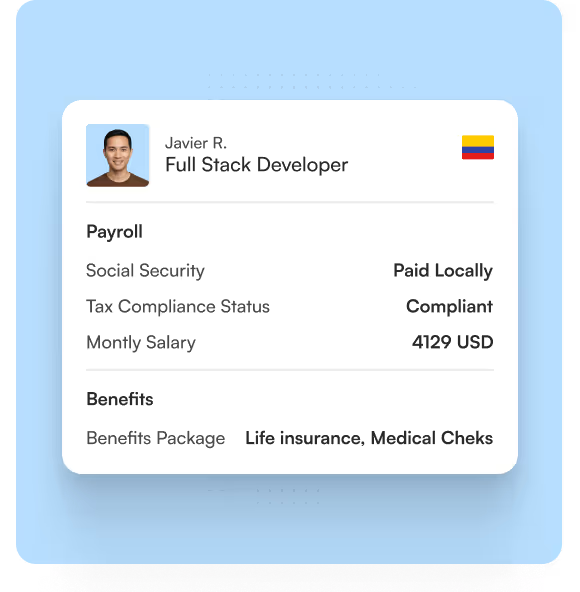15 Signs Your Interview Went Well, And What to Do Next


Lupa will help you hire top talent in Latin America.
Book a Free Consultation
Lupa helps you build, manage, and pay your remote team. We deliver pre-vetted candidates within a week!
Book a Free ConsultationThe minutes, hours, and days after a job interview can be filled with anxiety and uncertainty. You replay every answer in your mind, analyze each reaction from the interviewer, and search for clues about your performance. While there's never a guaranteed way to know if you'll receive a job offer, certain signals can indicate your interview went well.
Positive Signs During the Interview
The interview itself often contains the most immediate indicators of success. Pay attention to these signals during your conversation to gauge how well you're connecting with the interviewer.
1. The Interview Ran Longer Than Scheduled
One of the most telling signs an interview went well is when it extends beyond the allotted time. Hiring managers and recruiters carefully schedule their days and value their time highly. If an interviewer chooses to continue the conversation past the scheduled endpoint, it strongly suggests they find you engaging and want to learn more about your qualifications.
This is especially significant if the interviewer acknowledges they're running over schedule but continues anyway. Statements like "I know we're past our scheduled time, but I'd like to discuss one more thing" indicate genuine interest. Hiring managers simply don't invest extra time in candidates they've already decided against.
Remember that in today's competitive job market, time is a precious commodity. When a company invests additional minutes or even hours in your interview, it's one of the strongest signs the interview went well.
2. The Conversation Flowed Naturally
Interviews that feel more like conversations rather than formal question-and-answer sessions typically indicate positive rapport. When dialogue flows naturally, with shared laughter and personal connections, it suggests both cultural fit and interpersonal compatibility.
Look for these conversational elements during your interview:
- The interviewer shares personal anecdotes or experiences
- You find yourselves discussing topics beyond the strict job requirements
- The conversation includes moments of genuine laughter or humor
- There are few awkward silences or stilted exchanges
- The interviewer seems genuinely interested in your responses
Natural conversation indicates the interviewer is trying to establish a connection with you—something they wouldn't bother doing with candidates they don’t consider a good fit. This comfortable exchange is often one of the most reliable signs an interview went well.
3. Positive Body Language From the Interviewer
Non-verbal cues can speak volumes about an interviewer's interest level. Engaged body language suggests the interviewer is actively listening and interested in what you're saying. Watch for these positive signals:
- Consistent eye contact throughout the conversation
- Smiling and nodding while you speak
- Leaning forward to indicate interest
- Mirroring your gestures or posture
- Open body positioning (uncrossed arms, facing you directly)
For virtual interviews, digital body language is equally important. Look for focused attention on the screen, responsive facial expressions, and minimal distractions on their end. When an interviewer's body language remains consistently positive throughout your meeting, it's a strong indicator they're engaged with your candidacy.
According to research on nonverbal cues in professional settings, positive body language often correlates with higher levels of interest and engagement. When you notice the interviewer's body language reflecting openness and attention, it's one of the good signs your interview is progressing well.
4. The Interviewer Asked In-depth Follow-up Questions
Detailed follow-up questions indicate genuine interest in understanding your experience and capabilities. When an interviewer probes deeper into your responses with thoughtful follow-up questions, they're evaluating how you would perform in the role rather than simply checking boxes.
Pay attention to questions that:
- Ask for specific examples from your experience
- Explore how you would handle situations relevant to the position
- Dig deeper into projects you've mentioned
- Request clarification on your approach to problems
- Seek to understand your thought process
Interviewers who are merely going through the motions typically stick to scripted questions without meaningful follow-up. In contrast, engaged follow-up questioning is one of the clearest signs an interview went well and that the hiring manager is seriously considering your fit for the position.
5. You Were Introduced to Team Members
Being introduced to potential colleagues, team members, or other departments is a particularly strong positive sign. Companies typically don't invest additional employees' time in candidates they don't seriously consider.
These introductions might include:
- Impromptu meetings with potential teammates
- A tour of the office or work environment
- Conversations with department heads or senior leadership
- Virtual introductions to remote team members
- Discussions about how you would collaborate with specific colleagues
Impromptu introductions are especially positive as they weren't part of the original interview plan. When an interviewer takes the initiative to introduce you to others in the organization, it suggests they're already envisioning you as part of the team—one of the most encouraging signs an interview went well.
Promising Signs About the Role and Company
How the interviewer discusses the role and company can provide valuable insights into their level of interest in you as a candidate.
6. The Interviewer "Sold" You on the Job and Company
When interviewers spend significant time highlighting company benefits, company culture, and perks, they're likely trying to make the position attractive to candidates they want to hire. This "selling" behavior suggests they're concerned about you accepting an offer if extended.
If the interviewer seems eager to present the company in the best possible light, it's often because they're already thinking about convincing you to accept a potential offer, which is a great sign. This enthusiasm for showcasing the company's strengths is one of the good signs your interview has made a positive impression.
7. Detailed Discussion About the Role and Responsibilities
In-depth conversations about specific job duties, projects, and expectations indicate serious consideration. Interviewers who provide comprehensive details about day-to-day responsibilities are likely envisioning you in the role.
Look for discussions that include:
- Specific projects you would be working on immediately
- Detailed explanations of team structures and reporting relationships
- Concrete examples of challenges you would address
- Clear articulation of performance expectations
- Questions about how you would approach particular aspects of the role
When an interviewer takes the time to paint a detailed picture of what your work life would look like, it's one of the signs the interview went well and they see potential value in bringing you aboard.
8. Discussion of Advancement Opportunities
Conversations about career growth, professional development, and long-term opportunities within the company suggest the interviewer sees potential for a lasting relationship. These forward-looking discussions indicate they're thinking beyond the immediate hiring decision.
Pay attention when the interviewer:
- Outlines potential career paths within the organization
- Discusses training programs or educational benefits
- Mentions mentorship opportunities
- Asks about your long-term career goals
- Explains how the role could evolve over time
Companies don't invest time discussing growth trajectories with candidates they don't plan to hire. When an interviewer voluntarily shares information about advancement opportunities, it's one of the positive signs your interview has positioned you as a promising long-term addition to the team.
9. Use of Assumptive Language
Subtle linguistic shifts can reveal an interviewer's mindset. Phrases like "when you join the team" rather than "if you join the team" indicate positive consideration. This assumptive language suggests the interviewer is already mentally including you in the organization.
Listen for phrases such as:
- "You'll be working with our team on..."
- "Your desk would be located in..."
- "When you start, we'll begin by..."
- "The team you'll be joining is..."
- "Your manager would be..."
Consistent use of assumptive language throughout the interview is particularly meaningful. When an interviewer speaks as if you're joining the company is a foregone conclusion, it's one of the strongest signs an interview went well.
Positive Signs About Next Steps
How the interviewer handles the end of the interview and discusses the next stage can provide valuable clues about their level of interest.
10. Questions About Your Availability and Notice Period
Inquiries about start dates, notice periods with current employers, or scheduling conflicts indicate practical consideration for hiring. These logistical questions suggest the interviewer is thinking about onboarding timelines.
Be attentive when the interviewer asks about:
- How much notice you need to give your current employer
- Your availability for potential start dates
- Any planned vacations or commitments that might affect onboarding
- Relocation timelines, if applicable
- Your availability for subsequent interview rounds
These practical questions about timing indicate the company is seriously considering moving forward with your candidacy. When an interviewer shows interest in these logistical details, it's one of the good signs your interview process has positioned you as a viable candidate.
11. Clear Explanation of Next Steps in the Hiring Process
Detailed information about subsequent interviews, assessments, or decision timelines indicates continued interest. Vague or absent next steps might suggest hesitation, while specific plans indicate positive consideration.
Look for clarity regarding:
- The number and types of remaining interview rounds
- Names and roles of people you'll meet in future interviews
- Specific dates for next steps rather than general timeframes
- Clear timelines for when decisions will be made
- Details about any skills assessments or testing
Interviewers who provide clear, specific information about next steps are typically more serious about candidates. When you receive a detailed roadmap of the remaining hiring process, it's one of the telltale signs the interview went well and you're still in active consideration.
12. Request for References or Additional Materials
Requests for references, work samples, or additional documentation indicate the company is moving to the verification stage. These requests suggest the interviewer wants to confirm your qualifications before making an offer.
Pay attention when the interviewer asks for:
- Professional or academic references
- Portfolio samples or work examples
- Transcripts or certifications
- Background check authorization
- Additional application materials
Companies typically don't invest time checking references for candidates they don't seriously consider. Immediate requests during or right after the interview are particularly positive signs your interview has moved you to an advanced stage in the hiring process.
13. Questions About Other Opportunities You're Pursuing
Inquiries about other interviews or potential offers indicate competitive interest. These interview questions suggest the interviewer is concerned about losing you to another company and may be considering how to expedite their own process.
Listen for questions like:
- "Are you interviewing with other companies?"
- "How far along are you in other hiring processes?"
- "Do you have any pending offers we should be aware of?"
- "What's your timeline for making a decision?"
- "What would make our opportunity more attractive to you?"
When an interviewer expresses concern about competition for your talents, it's one of the clearest signs an interview went well and they see you as a valuable potential hire.
Post-Interview Positive Indicators
The period after your interview can provide additional clues about your standing as a candidate.
14. Prompt Response to Your Thank-You Email
Quick, personalized replies to follow-up communications indicate continued interest. Responses that include additional information about the role or next steps are particularly positive.
Look for replies that:
- Arrive within 24-48 hours of your thank-you email
- Include personalized content rather than generic responses
- Maintain the conversational tone from the interview
- Provide additional details about the position or company
- Express continued interest in your candidacy
Interviewers who take the time to respond substantively to your follow-up email are typically more engaged with your application. A prompt, thoughtful response is one of the good signs your interview has left a positive impression.
15. Unprompted Follow-up from the Interviewer
Proactive communication from the interviewer or recruiter is a strong positive indicator. Updates on the hiring process, additional questions, or check-ins about continued interest suggest active consideration.
Pay attention to:
- Emails or calls providing status updates without your prompting
- Additional questions about your experience or qualifications
- Check-ins about your continued interest in the position
- Information about timeline changes or process updates
- Follow-ups from multiple people at the company
The timing and frequency of these communications can indicate urgency in the hiring process. When you receive unprompted follow-up, especially from multiple people at the company, it's one of the strongest signs an interview went well and you're a top candidate.
{{staffing-embed}}
What to Do After Identifying Positive Interview Signs
After recognizing positive indicators from your interview, taking appropriate actions can help maintain momentum and position yourself favorably for an offer.
Send a Thoughtful Thank-You Note
A personalized thank-you email within 24 hours of your interview demonstrates professionalism and continued interest. This simple step can reinforce positive impressions and keep you top of mind.
To craft an effective thank-you note:
- Send it within 24 hours of completing your interview
- Address specific conversation points to demonstrate attentiveness
- Reiterate key qualifications that align with the position
- Express genuine enthusiasm without appearing desperate
- Keep the message concise and professional
If you interviewed with multiple people, send individual notes to each person. Personalize each message with specific references to your conversation with that interviewer. This attention to detail shows thoroughness and genuine interest in the position.
If you don't receive a response to your thank-you email within a week, a brief follow-up may be appropriate. Keep this communication concise and professional, simply inquiring about the status of the hiring process.
Document Important Information from the Interview
Recording key details, names, and insights while they're fresh can be invaluable for follow-up communications and subsequent interview rounds. This information can also help manage anxiety during the waiting period.
Make notes about:
- Names and roles of everyone you met
- Specific projects or challenges mentioned
- Questions or concerns that arose during the interview
- Positive reactions to particular aspects of your experience
- Timeline expectations for the hiring process
Documenting these details immediately after the interview ensures accuracy and provides valuable reference material for future interactions with the company. This practice is particularly helpful for preparing for the next round of interviews if your candidacy advances.
Continue Your Job Search
Maintaining job search momentum regardless of positive interview signs provides security and leverage. Even when you're confident about a particular opportunity, continuing to pursue alternatives ensures you don't lose momentum if the position doesn't materialize.
To balance enthusiasm with practical job search activities:
- Continue applying for positions that match your qualifications
- Attend networking events and maintain professional connections
- Follow up on other applications and interview opportunities
- Prepare for interviews with other companies
- Consider how you would handle multiple potential offers
This approach provides security while also potentially creating leverage if you receive multiple offers. Having alternatives demonstrates your market value and can strengthen your negotiating position if your preferred employer extends an offer.
Prepare for the Next Round
Use insights from the first interview to prepare for potential subsequent rounds. This preparation demonstrates professionalism and increases your chances of continued success in the hiring process.
To effectively prepare for next steps:
- Research additional team members who might be involved in future interviews
- Prepare to address any weaknesses or gaps identified in the initial interview
- Develop more specific questions based on your deeper understanding of the role
- Review company information more thoroughly now that you have insider context
- Practice responses to likely follow-up questions based on your first interview
This targeted preparation shows commitment and helps you build on the positive impression from your initial interview. Thoughtful preparation for subsequent rounds is particularly important for technical interviews, which often become more detailed and specific as the process advances.
When Positive Signs Don't Lead to an Offer
Despite experiencing multiple signs an interview went well, sometimes candidates don't receive job offers. Understanding this reality helps maintain perspective during the waiting period.
Hiring decisions are influenced by factors beyond candidate performance, such as internal candidates, budget changes, or reorganizations. Positive interviews can still result in rejection due to circumstances outside your control, including:
- Internal candidates receiving priority consideration
- Budget freezes or reductions affecting hiring plans
- Reorganization of teams or departments
- Changes in business priorities or project timelines
- Hiring manager turnover or organizational changes
Professional growth comes from both successes and disappointments. By approaching each interview as a learning opportunity, you build skills that increase your chances of success in future job searches. This growth mindset is particularly valuable when spotting companies with great cultures where you'll thrive professionally.
Ready to Find Your Perfect Career Match?
Are you a talented professional in Latin America looking for opportunities with U.S. companies? At Lupahire, we specialize in connecting premium LatAm talent with quality-focused employers who value your skills and expertise.
Unlike traditional recruiters focused on speed and volume, we take a strategic, relationship-driven approach to matching professionals with roles where they'll truly thrive. Our consultative process ensures you're presented with opportunities that align with your career goals and strengths.
Book a discovery call today to learn how we can help you navigate your next career move with confidence. We're built with LatAm, for LatAm, and committed to helping you find not just any job, but the right job where you'll make a meaningful impact.

"Over the course of 2024, we successfully hired 9 exceptional team members through Lupa, spanning mid-level to senior roles. The quality of talent has been outstanding, and we’ve been able to achieve payroll cost savings while bringing great professionals onto our team. We're very happy with the consultation and attention they've provided us."


“We needed to scale a new team quickly - with top talent. Lupa helped us build a great process, delivered great candidates quickly, and had impeccable service”


“With Lupa, we rebuilt our entire tech team in less than a month. We’re spending half as much on talent. Ten out of ten”























